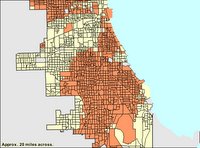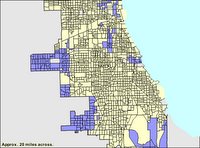Both
Languagehat and Ben Zimmer at
Language Log have posted recently about the new improvements made to the
MLA Language Map. Specifically, a feature was added so that languages could be mapped by percentage of speakers, rather than by number of speakers, which they had previously called "density." This is an indeed an improvement, which transforms this website from useless to marginally useful. I'll reveal now what I should have revealed when people were
first posting about the MLA Language Map. These maps are based on census data, right? So why not go directly to the US Census Bureau's own
online mapping tool? If you like maps as much as I do (and I hope you don't), you will be able to waste countless hours making endless maps. It's harder to use than the MLA's interface, but it's infinitely more manipulable. You can select from a wide range of geographic subdivisions, pick your own data classes (and even the number of them), and you can map a wide variety of data: age, race, income, even reported ethnicity (the choices there are almost exclusively European, unfortunately). Oddly, though, the only language-related data they let you map is "Percent of Persons 5 Years and Over Who Speak a Language Other Than English at Home," and "Percent of Persons 5+ Years Who Speak Other Than English at Home & Speak English Less Than 'Very Well.'" Still, though, you can see amazing things, like for instance how strikingly segregated Chicago's South Side is:

+50% African-American

+50% Hispanic

+50% White
Isn't that amazing? In a city roughly evenly divided between these three groups, just about every inch of the city is overwhelmingly dominated by one group, usually to the exclusion of the other groups. Look at how each area is precisely delineated. These are lines that any South Sider knows instinctively and thinks of almost like a physical boundaries.
Anyways, go play around on the Census Bureau's website, and you'll never be satisfied with the MLA's mapping tools again, even if they do monopolize mappable language data.



No comments:
Post a Comment